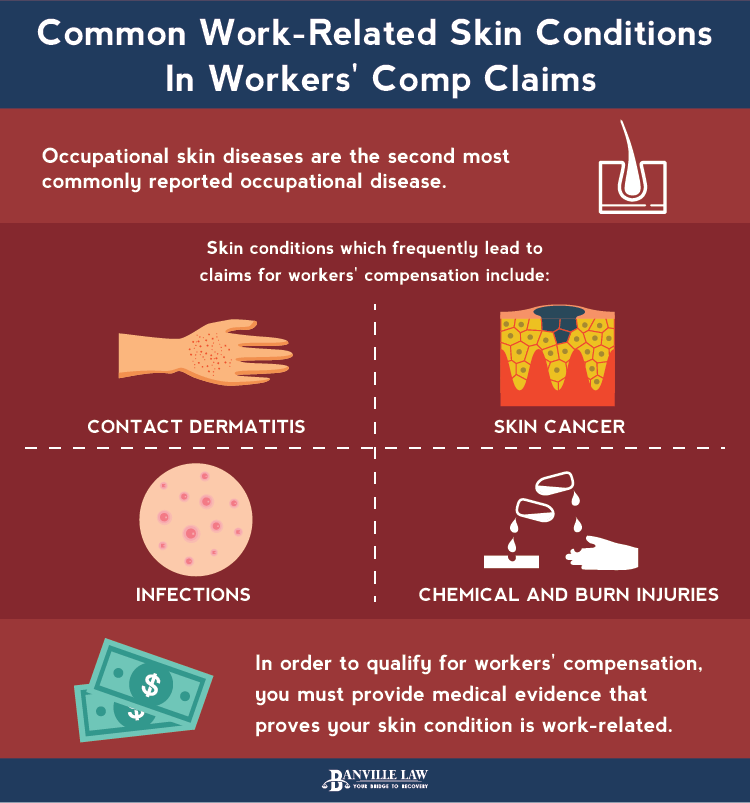Each year, millions of American employees develop work-related skin conditions. These conditions may occur due to excessive exposure to the sun or contact with harmful chemicals or other substances. A skin problem can be seriously painful and often requires extensive medical treatment. In some cases, these conditions may be severe enough to prevent you from returning to work for days, weeks, months, or even years.
According to the Centers for Disease Control (CDC), occupational skin disorders are the second most common type of occupational disease. Under New York’s Workers’ Compensation Law, all employees are guaranteed coverage in the event of a work-related injury or occupational disease. If you’ve developed a skin condition which you suspect is related to work, you should consider filing a report and scheduling an appointment with a certified workers’ compensation doctor.
Not all skin conditions are eligible for workers’ compensation. In order to file a claim, you must establish that your skin condition or disease was a direct result of your work environment.
Even when there is a direct causal link between your condition and your work duties, it can be difficult to recover the financial compensation you need. Insurance companies look for reasons to deny claims, and employers may dispute claims to keep their insurance premiums low. Establishing a work relationship for occupational diseases and slowly acquired conditions is especially challenging, but an experienced work injury lawyer can help you through the process.
Can You Get Worker’s Compensation For Mental Illnesses? Learn more here.

Occupational skin diseases are commonly caused by chemical, infectious, or physical factors. Diseases and conditions which frequently require days missed from work include:
This is the most common occupational skin disease. It’s usually caused by contact with a chemical irritant or sensitizing chemical substance and involves inflammation at the point of contact with that irritant or substance. Workers in the following industries are all at a high risk for contact dermatitis:
Occupational skin cancer may develop due to frequent contact with hazardous substances (e.g. Tar, soot, minerals, oils, coal tar distillation products) or by working long hours outdoors, in jobs like construction or landscaping.
Some occupations involve frequent exposure to possible infectious hazards which could lead to bacterial or fungal infections. High-risk workplaces include:
Cuts, bruises, abrasions, and lacerations may lead to complications like infections. Additionally, direct contact with corrosive chemicals or heat sources can cause serious burn injuries which can leave permanent scarring or disfiguring injuries.
When diagnosing and treating a skin condition, it’s important to consider all of the factors which could have lead to the condition. When you receive medical treatment, you should be open with doctor about your lifestyle, including your work environment. While some skin conditions may be clearly work-related, others will take a careful evaluation of your medical history to determine if there is an occupational link. Providing detailed medical evidence is the most important part of any workers’ compensation claim.
While you have the option to represent yourself, you will stand a much better chance at receiving compensation if you have a respected work injury lawyer to represent you. Workers’ compensation insurance carriers are just like any other insurance company – the more claims they deny, the higher their profits. These companies have their own highly skilled lawyers who specialize in finding reasons to deny claims.
Having an experienced lawyer in your corner means these companies will be less likely to play games with you while you’re waiting for your benefits. For claims which genuinely require workers’ compensation, they will be much more likely to simply approve your claim.
At Banville Law, our experienced work injury legal team has the respect of the insurance companies. We understand how this system works, how to provide everything needed for a successful claim and appeal, and how to respond to an insurance company or employer’s efforts to deny or dispute claims. We’re prepared to help you secure the financial compensation you deserve for an occupational skin disorder.
Read more about Options For Financial Compensation After A Workplace Burn Injury here.